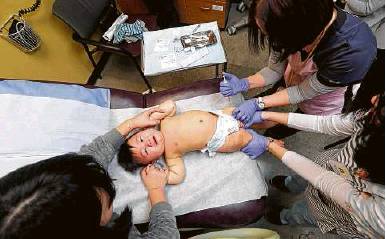Measles emerge; health leaders sound alarm
7 confirmed cases in 2019 alone could push for a pro-vaccine bill
By Jay R. Jordan and Todd Ackerman STAFF WRITER
Amid a Gulf Coast cluster of measles and multiple flu-caused school closures around the state, Houston public health leaders on Wednesday sounded the alarm about the risk posed by the state’s growing numbers of parents opting not to vaccinate their children.
At a news conference, the leaders noted that many of such unvaccinated children cluster in the same geographic areas where the state is seeing outbreaks of vaccine-preventable diseases. The numbers have grown to the tens of thousands since the non-medical “reasons of conscience” exemption went into effect early in the millennium.
“The Texas Legislature has to have the political courage to admit that they were duped by anti-vaxxers into creating dangerous loopholes in state public vaccine laws,” said Allison Winnike, president of the Immunization Partnership, a Houston-based advocacy group. “Reach out to legislators to tell them to take the steps needed to keep our families and our communities protected.”
Dr. Peter Hotez, a Houston infectious disease specialist who has waged a campaign against the exemption, called the matter “an epic struggle.” He said, “we’re defending the fundamental rights of children to be protected against deadly infections through vaccination versus the status quo in which children are now denied access to vaccines because of misinformation and phony slogans like ‘medical freedom.’”
The news conference followed a week in which seven cases of measles were confirmed in Texas—three in Harris County, one in Montgomery County, one in Galveston County and two in other parts of the state. Asixth possible local case — a pre-K student at La Porte Elementary — is being investigated, officials announced Tuesday.
In addition, at least nine schools across Texas this month have closed for one or more days due to outbreaks of the flu.
In Texas, children are required to have certain sets of vaccinations before they can be enrolled in public school — including the vaccine for measles. Until 2003, the only exception was amedical condition.
But that year, the Texas Legislature allowed parents to choose not to have their child vaccinated for “reasons of conscience.” It does not define what constitutes a “reason of conscience,” meaning that any parent, for any reason, can decide not to immunize their children.
Since 2003, the number of Texas schoolchildren not vaccinated because of the exemption has skyrocketed from about 2,300 in 2004 to nearly 57,000 Texas schoolchildren in 2018, according to the latest statistics.
The officials said the recent outbreaks of measles, a highly contagious disease thought to be virtually eliminated in the U.S. until recently, are no coincidence. There was only one confirmed case of measles throughout Texas in each of 2015, 2016 and 2017, then nine in 2018 before this year’s seven less than 1 1/2 months into 2019.
A number of vaccination bills have been filed in the Legislature, though none that would strike down the non-medical exemption and at least one that would further loosen the process.
That bill would require the state health department make the opt-out form available not just on its website but in schools. It also would prohibit the state health department from collecting the number of exemptions filed and not require data be reported to the legislature.
A pro-vaccine bill would require a biennial report on any outbreaks of vaccine-preventable diseases and allow parents to view data about exemption numbers for each school. Current law only makes such information publicly accessible at the district level.
Eliminating the non-medical exemption is considered a non-starter in the current Texas Legislature, but Winnike suggested a groundswell movement could change that.
“The public is starting to demand change,” said Winnike. “More and more people are telling us they’re sick and tired of their communities getting sick. They don’t want to keep paying the price of the Legislature relaxing the law.” jay.jordan@chron.com twitter.com/jayrjordantodd.ackerman@chron.com twitter.com/chronmed
